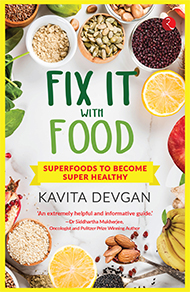Saurabh Tankha
Kavita Devgan says she is a liberal dietician and doesn’t believe in the “all” or “nothing” approach. She believes the answer lies in between somewhere. Her mantra and advice to everyone is “more of the good and less of the bad” and that food per se is not a problem. “Usually, it is the portion or the wrong habit which creates problems. For example, if you keep drinking 20 lemonades a day, it is not the lemonade which is the problem, it is the habit that is the problem,” says Kavita who recently release her third book, Fix It With Food: Superfoods to become Superhealthy (Rupa Publications; Rs 195).
www.lifeandmore.in had a chat with the dietician-author…
How important are superfoods in our lives? Why has it taken us so long to understand their importance?
We lead very stressful lives, always in a hurry and forever multitasking and for most of us, this translates to bad eating decisions which leads to health loss. That is why it is important to ensure we consciously include foods that are packed with nutrients and antioxidants to avoid deficiencies. As I write in the prologue of the book “the truth is that we are in general overfed, but our diet is completely inadequate. And superfoods help fill that gap.” But it is important to understand what superfoods are. Superfoods are foods that deliver concentrated — extra-large doses of vitamins and minerals — nutrients that are good for you. Now every food has some goodness inherent in it, but some foods deliver them en masse, in loads. They are so nutrient-dense, that they are almost like a medication, a supplement. But, of course, far better.
Any superfoods to counter coronavirus or at least, keep it at bay?
All foods that boost our immunity fit this bill… There are plenty covered in the book.
When did the idea of penning a book on superfoods strike and how much time did it take you to complete it – cover to cover?
I have been writing about foods that help us stay healthy for forever now… for different columns and media houses… so this book has been written in pieces and bits over the last couple of years. In the end, I took me about three months to put the whole information together in the shape of a coherent book.
What kind of research goes into writing a book of this proportion?
Lots, actually as all the facts have to be right and then one needs to be able to keep it interesting and throw in some fun stuff to stop it from being a boring, just factual read.

How did you go about shortlisting the foods, then dividing them into Parts and thereafter, Chapters?
My biggest trouble was deciding which foods to leave out — as (luckily for us) foods that can do good to our body are many. But that would have made the book a tome and most people don’t have the patience to read a time… Otherwise, rest all — deciding on chapters, sections etc — is just a technique which one gets the hang of.
Over the last two decades plus as a nutritionist, have some foods made it to the list of superfoods while some have lost the race?
Yes, have left out foods that are not easily available to a layman or are too expensive deliberately. This book is about everyday superfoods — foods that are all around us but we don’t take them seriously.
This must have happened with you hundreds of times – you are at a social gathering and see people binging on “unhealthy food”. At that moment, does the nutritionist in you walk up and tell them the harmful effects or do you choose to ignore?
I never give unsolicited advice. Also, it is wrong to judge people without knowing them well. Maybe this is their cheat meal, and they otherwise eat healthy.